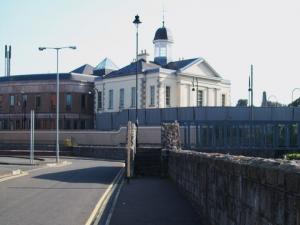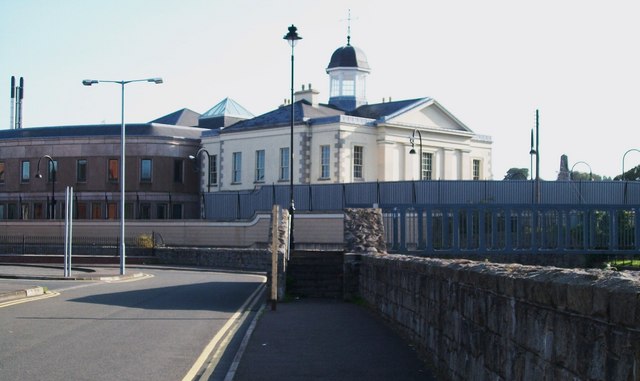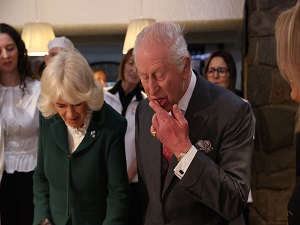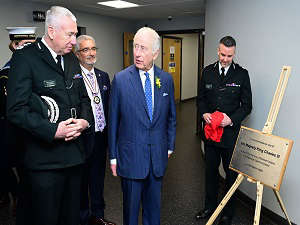
By Paul Higgins
The 31st man to be charged in NI under the Europe-wide Operation Venetic investigation into organised crime appeared in court today.
Armagh Magistrates Court, sitting in Newry, heard that in addition to 13 classic and high end cars seized, police also found a notebook with alleged drug references “totalling around £2 million pounds and Euro” owed to 33-year-old William John Hewitt.
The married father-of-two who runs a shop and is from the Lower Foughill Road in Jonesborough, appeared at court by videolink from police custody, confirming that he understood the four charges against him.
Hewitt was charged with three drugs offences accusing him of conspiring to import cannabis and being concerned in offers to supply cocaine and cannabis and one further count alleging that he entered an arrangement to acquire criminal property, all alleged to have been committed between 25 March and 15 June last year.
The 33-year-old was arrested on Monday after detectives from the PSNI’s Organised Crime Branch seized 14 high end and classic cars, valued at between £500,000 and £750,000, from a warehouse in Newry and from Hewitt’s home.
During a contested bail application, prosecuting counsel Robin Steer described how the offences arose after investigators were able to obtain data which was previously encrypted, adding that officers believe Hewitt “is involved in drug dealing at a very high end involving multiple consignments of drugs and he is part of a network I no the supply of drugs.”

Explaining that encrypted handsets could only interact with similar handsets using code names, he revealed that from obtained data, officers were attributing the username Eagletoxic to Hewitt.
The lawyer told the court that in the unencrypted messages, the user Eagletoxic had called twice himself Hewitt and had “sent a picture of himself lying in the bath.”
He said the seizure of the classic cars was significant in that in the messages, the user had sent messages referring to a car collection and declaring “Hewitt will be known as legend.”
Meanwhile a search of Hewitt’s home uncovered a notebook “hidden behind the microwave” which when it was examined, contained “multiple references to the same type of terminology used in encrypted data” referring to different types of drugs.
“This notebook contains these slang terms and of significance for this defendant, he had very large sums of money....both sterling and Euro, hundreds of thousands of pounds owed to this defendant,” claimed Mr Steer adding that when totalled up, there was “in excess of £2 million.”
Turning to objections to bail, he said the investigation into Hewitt was “at an early stage” so police feared that if released, he could interfere with that “significant financial investigation” by dissipating any assets not yet identified.
Both the lawyer and the detective highlighted that Hewitt lives within a few miles of the border so given the possibility of a lengthy jail sentence if convicted, “he may move across the border.”
Hewitt’s defence solicitor argued however that the entirety of NI a was within an hours drive of the border, submitting that with a pregnant wife, two young children and a family business in Newry, along with the availability of a £10,000 cash surety, he was not a flight risk.
He further submitted it was well publicised that detectives had hacked the encrypted network nine months ago so Hewitt would already have had time to hide or dispose of any assets, highlighting that the police could go to the High Court to seek an order freezing his finances.
Although he argued that conditions could be put in place to address police concerns, Deputy District Judge Philip Mateer refused to grant bail.
The judge said he felt there was a risk of Hewitt absconding and given the concerns “that he may frustrate the police investigation by dealing with assets that are not yet known,” he was remanding Hewitt into custody.
The case was adjourned to 24 March.


 King and Queen test their baking skills during Northern Ireland visit
King and Queen test their baking skills during Northern Ireland visit
 Teachers offered 5.5% pay rise in ‘enhanced package’
Teachers offered 5.5% pay rise in ‘enhanced package’
 Belfast named UK’s biggest pub music scene outside London
Belfast named UK’s biggest pub music scene outside London
 King and Queen meet creatives during visit to heart of Belfast
King and Queen meet creatives during visit to heart of Belfast
 Man, 18, remanded in custody charged with attempted murder in Belfast
Man, 18, remanded in custody charged with attempted murder in Belfast